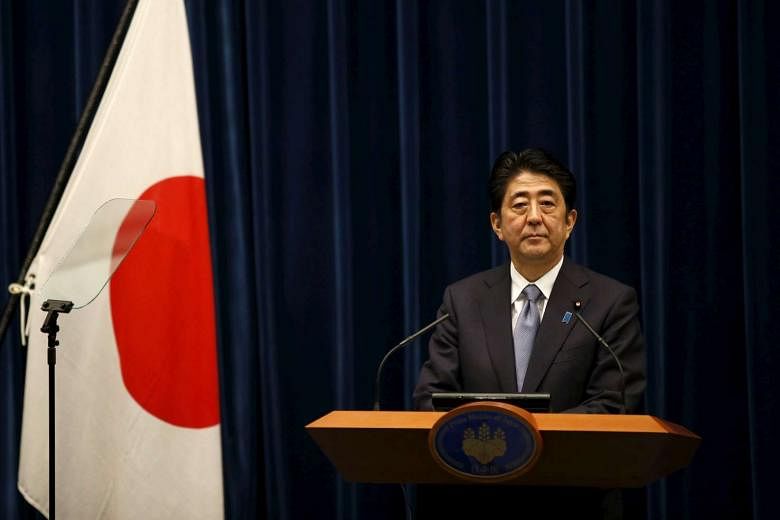TOKYO (Reuters/AFP/Bloomberg) - Japanese Prime Minister Shinzo Abe expressed deep remorse Friday over World War II and said previous national apologies were unshakeable, but emphasised future generations should not have to keep saying sorry.
In the closely watched speech, the nationalist Premier appeared to tread a fine line between regret over Japanese wartime aggression while also focusing on what his pacifist country had done since the end of the conflict.
In the statement marking the 70th anniversary of World War II's end, Mr Abe acknowledged Japan had inflicted "immeasurable damage and suffering" on innocent people, but said generations not involved in the conflict should not be burdened with continued apologies.
"On the 70th anniversary of the end of the war, I bow my head deeply before the souls of all those who perished both at home and abroad. I express my feelings of profound grief and my eternal, sincere condolences," he said. "We must never again repeat the devastation of war."
"Upon the innocent people did our country inflict immeasurable damage and suffering," Mr Abe said in a statement. "When I squarely contemplate this obvious fact, even now, I find myself speechless and my heart is rent with the utmost grief."
"Japan has repeatedly expressed feelings of deep remorse and heartfelt apology for its actions during the war... we have consistently devoted ourselves to the peace and prosperity of the region since the end of the war," Mr Abe added.
"Such position(s) articulated by the previous cabinets will remain unshakable into the future."
Mr Abe also said he upheld past government apologies over the war including the landmark 1995 statement by then Premier Tomiichi Murayama, but offered no new apology of his own.
Mr Abe's conservative political allies have urged him to end what they see as a humiliating cycle of apologies that distracts from Japan's post-war record of peace.
"In Japan, the post-war generations now exceed 80 per cent of its population. We must not let our children, grandchildren, and even further generations to come, who have nothing to do with that war, be predestined to apologise," he said.
"Still, even so, we Japanese, across generations, must squarely face the history of the past."
When speaking about China, Abe referred to "unbearable sufferings caused by the Japanese military".
He referred to the wartime sufferings of the Chinese in his statement, and said he hoped China would recognise Japan's "candid feelings" and that he hoped to meet Chinese President Xi Jinping if the opportunity arose.
But he told the news conference that attempts to "change the status quo by force" were unacceptable.
Tokyo and Beijing are feuding over tiny East China Sea isles, while Japan is also wary of China's military assertiveness in the South China Sea.
Mr Abe said Japan should "never forget that there were women behind the battlefields whose honour and dignity were severely injured".
But he made no direct reference to "comfort women", as the women, many of them Korean, forced into prostitution at Japanese wartime military brothels are euphemistically known.
Tokyo and Seoul have long been at odds over the issue of comfort women, with South Korea saying Japan has not done enough to atone for their suffering despite a 1993 apology that recognised authorities' involvement in coercing the women.
Mr Abe said that Japan took the "wrong course and advanced along the road to war", but his statement did not specifically refer to what a report by his own advisers had called Tokyo's"aggression" in China after 1931.
He told the news conference that the question of whether a specific act was "aggression" should be left to historians.
Japan's wartime history has come under a renewed focus since Mr Abe swept to power in late 2012.
The 60-year-old has been sharply criticised by some for playing down Japan's past and trying to expand the role of the military.
Mr Abe's remarks were being closely watched abroad for whether the conservative leader is watering down past apologies.
The statement comes as he pushes for a more robust defence policy through measures domestic critics say violate Japan's pacifist Constitution. Public doubts about the bills have triggered a slide in Mr Abe's ratings to below 40 per cent.
Washington has welcomed the changes, which Mr Abe says are needed to meet new challenges, including a more assertive China.
The legacy of the war still haunts relations with China and South Korea, which suffered under Japan's sometimes brutal occupation and colonial rule before Tokyo's defeat in 1945.
Beijing and Seoul have made clear that they want Mr Abe, seen by many as a revisionist who wants to play down the dark side of Japan's wartime past, to stick to a 1995 "heartfelt apology" by then-premier Tomiichi Murayama for suffering caused by Tokyo's"colonial rule and aggression".
The United States also wants Mr Abe to avoid inflaming tensions in the region.
Read the full speech by Prime Minister Abe here: pdf

